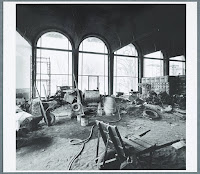 Every day, the Dartmouth Coach enters the small town of Hanover
and pulls up in front of the Hopkins Center. I remember stepping down the short bus steps and looking around the
Dartmouth campus for the first time. As
I gazed at its scenic landscape, I obtained a sense of the history that took
place here. Across the green from where I stood is
Rauner Special Collection Library. Inside, one can find
endless documents on the history of Dartmouth College, starting from its
origins up to the present day. The evolution of Dartmouth’s
campus and its buildings represents the numerous different time periods this
College has experienced. Altering one
space on this historic campus can change Dartmouth’s “feel”. Until I researched the changes of Dartmouth’s physical plant during World War I for a history class, little did I know that the place I
first pulled up to, Hopkins Center, was one of the most controversial buildings
to be built.
Every day, the Dartmouth Coach enters the small town of Hanover
and pulls up in front of the Hopkins Center. I remember stepping down the short bus steps and looking around the
Dartmouth campus for the first time. As
I gazed at its scenic landscape, I obtained a sense of the history that took
place here. Across the green from where I stood is
Rauner Special Collection Library. Inside, one can find
endless documents on the history of Dartmouth College, starting from its
origins up to the present day. The evolution of Dartmouth’s
campus and its buildings represents the numerous different time periods this
College has experienced. Altering one
space on this historic campus can change Dartmouth’s “feel”. Until I researched the changes of Dartmouth’s physical plant during World War I for a history class, little did I know that the place I
first pulled up to, Hopkins Center, was one of the most controversial buildings
to be built.
 As one can
see from the photos accompanying this post, the Hopkins Center has a different style of
architecture than the rest of the campus. In the late 1920s, Dartmouth College’s Advisory Committee on Plant
Development created a plan for constructing a new social center. However, the College needed to overcome some
challenges before the plans for the building could be approved. In the late 1950s, the Board of Trustees and
Dartmouth community as a whole felt that Georgian architecture was out of style
and was no longer suited for its campus. The Advisory Committee on Plant Development asked Wallace Harrison to
develop a design for this new social center. Harrison’s design was modern, which resulted in countless debates if
this was the direction Dartmouth College wanted to go. The location for the Hopkins Center was
another massive issue that resulted in delayed approval, given that the Hanover Green was a highly desirable location in town. However, after many years, the
development plans for Hopkins Center were approved and the facility was built in 1961.
As one can
see from the photos accompanying this post, the Hopkins Center has a different style of
architecture than the rest of the campus. In the late 1920s, Dartmouth College’s Advisory Committee on Plant
Development created a plan for constructing a new social center. However, the College needed to overcome some
challenges before the plans for the building could be approved. In the late 1950s, the Board of Trustees and
Dartmouth community as a whole felt that Georgian architecture was out of style
and was no longer suited for its campus. The Advisory Committee on Plant Development asked Wallace Harrison to
develop a design for this new social center. Harrison’s design was modern, which resulted in countless debates if
this was the direction Dartmouth College wanted to go. The location for the Hopkins Center was
another massive issue that resulted in delayed approval, given that the Hanover Green was a highly desirable location in town. However, after many years, the
development plans for Hopkins Center were approved and the facility was built in 1961.
 The Hopkins Center has become one of the key buildings on this campus. It has awakened students' interests in the
art community and provides an educational environment that allows students' creativity and passion for art to explode. Information on this building is just a small fraction of the historical documents that
the Rauner Library collections contain about Dartmouth’s campus.
The Hopkins Center has become one of the key buildings on this campus. It has awakened students' interests in the
art community and provides an educational environment that allows students' creativity and passion for art to explode. Information on this building is just a small fraction of the historical documents that
the Rauner Library collections contain about Dartmouth’s campus.For more information on Dartmouth’s historical campus, go to Rauner Library and look at Dartmouth College Historical Evolution and Preservation:Strategies for the Landscape(D. C. Hist LD1422.9 .D334 1996). To see more great photos of the Hopkins Center, and other buildings on the Dartmouth College campus, browse the images in our Photographic Files and Photographic Records collections, many of which are available for free download online.
Posted for Danny McManus '17, HIST 62 class.
No comments :
Post a Comment